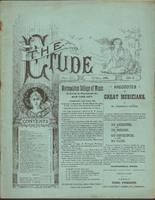Music, played or sung, is an utterance. St. Paul, speaking of musical instruments, calls them “things without life, giving a voice.” The culture of this voice is the end of our studies in touch and technic. But it is possible that this voice may be cultivated to the highest perfection and yet the utterance may remain innocent of intelligent expression.
In what may be called musical trichotomy, the body consists of the piano and the fingers, etc. of the performer; the soul—touch, technic, phrasing, etc.; as for the spirit—its impress is revealed in what we call expression.
Is it possible for me to express the interpretation of the musical spirit of another, whether writer or composer, without having learned to express some of my own feelings?
A child expresses his thought before he learns grammar or knows a letter. Does a French youngster need to be told how to “place the tone” in order to acquire the nasal cadence? He gets it by ear—by imitation. If you wish to speak French, that is the way you will have to learn it. The biographies of great artists are full of instances of their imitating other artists—e.g., Rubinstein said he “sat hours at the piano trying to imitate Rubini’s voice.”
First then, let the pupil learn to express himself in music—by imitation. You play a note an octave above middle C softly, then let him try. This tone is like a rose—it has dimensions, brightness or softness, and color. It is a thing of beauty in itself, but its beauty is enhanced and its significance intensified when made a part of a combination. These combinations the teacher should supply by playing harmonies beneath; the more they are varied, the more the pupil’s interest is elicited and his aesthetic sense aroused and stimulated. Now play C, D, C softly and slowly, and then have him do it. He is beginning to contrast his own colors, elemental though they be. You again supply harmonies and change them often. Play E, D, C slowly and with diminuendo, and then let him. This, as a phrase or a cadence, is probably the most frequent fragment of melody in music; it is capable of adorning so many harmonic progressions, and thence it derives a wealth of meanings.
Working along these lines, lengthen the phrase to a short melody—eventually to a period of eight measures, and insist upon careful phrasing and shading in his playing. Now let the right hand play the first phrase of two measures, the left hand the second, the right the third, and the left the last. This will accentuate the antithesis between the phrases composing the period. Let both hands play together in sixths; now the upper part prominent, now the lower; now the upper part legato and the lower staccato, now the reverse. Do the same with thirds in each hand alone. Now try chords in four parts in the same way. Try an easy hymn-tune. The pupil must now learn the simplest harmonic progressions by memory, and with different accents and shading—this is imperative. Encourage him to pick out arpeggios and as soon as possible to make short melodies of his own.
In some such foundational way the pupil at length acquires something of a vocabulary and some ability to think musically. It follows as an axiom that the more one can think musically, the more he will understand and the better he can interpret. No one can make the piano sing unless he has already learned to “make melody in his heart.”
“The human heart e’er craves a song,” and Bach said “he took the trouble to write singing music for the piano.”
Expression is the revelation of some kind of sympathy —using the latter word in its generic sense of feeling or suffering with. Bach in his music reveals something of what he felt toward God and His creatures. The more I can sympathize with his spirit, or in other words, the more I can feel as he felt, the truer will be my interpretation of his song.
If then I wish to express, I must first feel, I must first suffer with. We feel deepest where we love the most. So he that loves most God and His creatures, whether man, beast, field or flower, will, other things being equal, express the most in his art.
Technic we must have as a means only. This is a great technic and pyrotechnic age, and it can produce a greater artist than has ever yet risen, provided that above all he has a great heart. The hour is ripe, when, after all our startling pyrotechnic display has reached its height, like some modern sky-rockets, it will be lost to our sight, and our attention will be directed to a bright star hanging in the firmament to be the most enduring joy and beauty of all.



